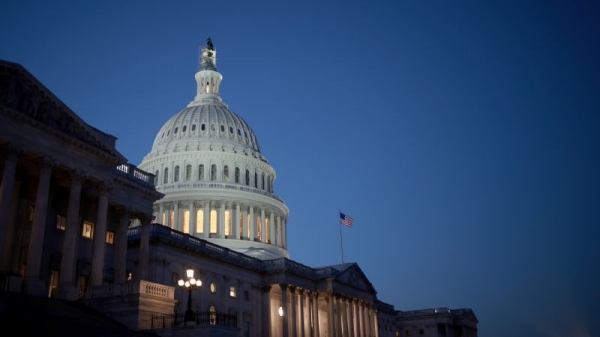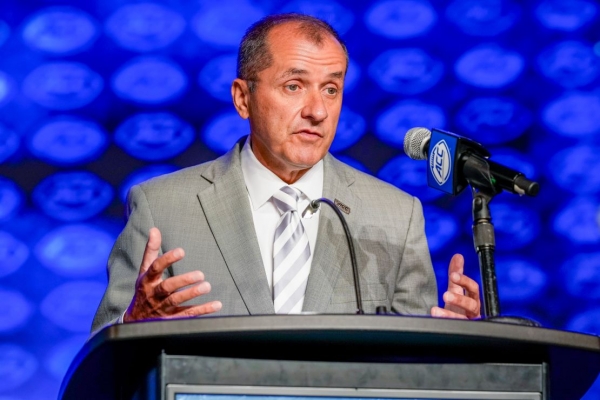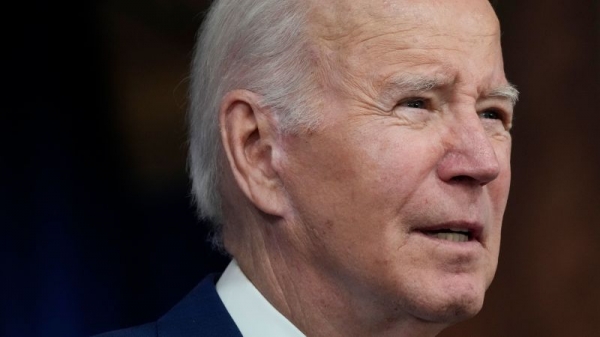NCAA leaders warn college sports at risk of ‘permanent damage’ without action from Congress

The NCAA’s most powerful conferences delivered an urgent plea to congressional leaders last week: We need your help to save college sports – and need it now.
The commissioners of the Big Ten, Big 12, Atlantic Coast Conference and Southeastern Conference quietly lobbied leaders in both parties – including Senate GOP Leader Mitch McConnell and House Democratic Leader Hakeem Jeffries – to back legislation that would set national standards on how collegiate athletes can profit on their name, image and likeness.
Their warning: That a Supreme Court decision two years ago that paved the way for companies to pay student athletes has led to a complicated series of state laws that have undermined collegiate sports and could ultimately lead to the collapse of sports programs across the United States.
“The risk is permanent damage to an enterprise that has meant an awful lot to our country, and to those that have benefited from the experiences,” James Phillips, the ACC commissioner, said on “Inside Politics Sunday.”
Greg Sankey, the SEC commissioner, had a dire prediction if Congress doesn’t act.
“The risk is we see states further build walls around their recruiting grounds, thinking that that somehow provides a competitive advantage,” Sankey said. “The risk is that more and more young people sign agreements that they don’t understand. The risk is we move further and further from the academic nature of college sports.”
In their first-ever joint interview, the four power conference leaders told CNN that the current landscape has created grave instability where collegiate athletes increasingly transfer to different universities based on different states’ rules on profiting off their name, image and likeness, or NIL. Athletes’ increasing use of the transfer portal, they said, has become problematic in college sports, particularly for student athletes’ quest to get a college degree.
And, they say, college boosters have taken advantage of the current patchwork of laws to help their universities recruit the top athletes by promising big paydays – to the detriment of colleges in other states that are forced to play by a different set of rules.
They say it’s time to set a national standard to even the playing field.
“You’ve got a system where it becomes very transactional, in terms of how student athletes are moving and you see it on the field,” said Big Ten Commissioner Tony Petitti. “You’ll see tremendous player movement, but there’s also another side of it, which is a lot of student athletes just don’t end up some place. And that’s a problem. Because the grass isn’t always greener, there isn’t always a deal that comes through.”
Petitti added that programs “can rise and fall very quickly” with players choosing to transfer, while the ACC’s Phillips said “multiple movements shown in the course of the student athlete’s career that they’re less likely to graduate.”
Multiple proposals have been put forward by lawmakers for a federal NIL law, though getting floor time for a bill, much less enacting one into law, will be an arduous task. There’s new focus on an effort by Sens. Ted Cruz, a Republican of Texas, and Cory Booker, a New Jersey Democrat, to try to strike a bipartisan accord on a proposal. The four commissioners met with the two senators last week.
“I’m confident that there’s a bipartisan path and the urgency to get something done is there,” Booker, a former college football player, told CNN. “I think everybody who has a football or basketball player in their state is interested in getting it done.”
Among the hurdles facing the leaders: GOP resistance to enacting federal legislation as Republicans often advocate for states’ rights.
Asked if there has been any resistance to the push for a national standard, Sankey, the SEC commissioner, said, “Sure. Questions about that – like, why, why is this necessary? Now our federal government does have a role in interstate commerce, that’s the reality. There’s interstate activity, this is a national activity.”
NIL deals stem from an NCAA policy change in 2021 that allowed student athletes to profit from sponsorship opportunities – a move that came after the Supreme Court said that student athletes could receive education-related payments in a case that reshaped the landscape of college sports.
Student athletes have taken advantage – with well-known names in college sports like basketball player Caitlin Clark and football player Caleb Williams appearing in commercials for major national brands such as State Farm and Wendy’s.
Supporters of a national standard say its implementation would help safeguard student athletes by setting up critical guardrails as they sign on for potentially lucrative opportunities.
“We need protection for our student athletes. You know, some of the situations that they find themselves in, trusting advisors that steer them in the wrong direction end up being really counterproductive and harmful,” Phillips said.

ACC commissioner James Phillips speaks to the media during ACC Media Days at The Westin Charlotte.
Jim Dedmon/USA Today Network
In some cases, he said, “agents end up taking more of the income than goes to the student athlete or to their families.”
Brett Yormark, commissioner of the Big 12, said that it’s difficult for student athletes to navigate the different rules in different states.
“We think it’s positive for student athletes to be able to leverage their name, image and likeness in all the right ways. But we need some guardrails around it,” Yormark said.
In the absence of federal legislation, a number of states have enacted their own laws, creating a legal patchwork around the country.
“It’s created a disparity among states, where legislators are now changing their laws for competitive purposes. It certainly has created economic opportunity for younger people, but it has introduced an unregulated marketplace,” Sankey said.
“What we’re constantly hearing, from young people, from those on our campus involved in recruiting, is the current environment doesn’t make sense,” he said.
Asked whether McConnell and Senate Majority Leader Chuck Schumer expressed interest in a national standard, Sankey said that “both, very much interest, and in fact, both reflected on each other and the importance of having conversations on both sides of the aisle.”
There is bipartisan support in Congress for a law to set a national NIL standard, but some Republicans have warned that any new law must be crafted with minimal government intervention and without setting up new federal agencies to make or enforce rules, a potential sticking point in any negotiation.
Cruz told CNN he thinks “the prospects of passing NIL legislation are about 60/40,” and feels “cautiously optimistic.”
“I think we are risking doing enormous damage to college athletics if Congress does not step in and act. It is the wild west right now, and every senator, their universities in their states are telling them that this chaos makes no sense,” he said.
Cruz has put forward a draft bill to codify NIL rights. Separately, Booker released his own draft NIL bill along with GOP Sen. Jerry Moran of Kansas and Democratic Sen. Richard Blumenthal of Connecticut.
Cruz and Booker have had discussions over the two proposals and the issue of NIL as part of an ongoing effort in the Senate to find a way forward to pass bipartisan legislation.
Cruz told CNN he has had “very positive conversations” with Booker. “I think we’re making progress, but we’re not there yet,” he said.
Additionally, Republican Sen. Tommy Tuberville of Alabama, the former head football coach at Auburn University, and Democratic Sen. Joe Manchin of West Virginia have introduced an NIL bill.
“There’s enough positive in all the bills, to be honest, that we can work with some combination,” Petitti said. “The effort has been, especially over the last few months, let’s try to bring people together. There’s a lot of staff putting time in it. How can we get those staff to bridge and come together to have something.”
“There’s tremendous interest from our elected officials,” Phillips said. “They understand, I think, what’s at stake. I think at the core of this, for each of us and anybody that loves college athletics, is this idea of opportunity for young people.”
CNN’s Ted Barrett and Wayne Sterling contributed.





